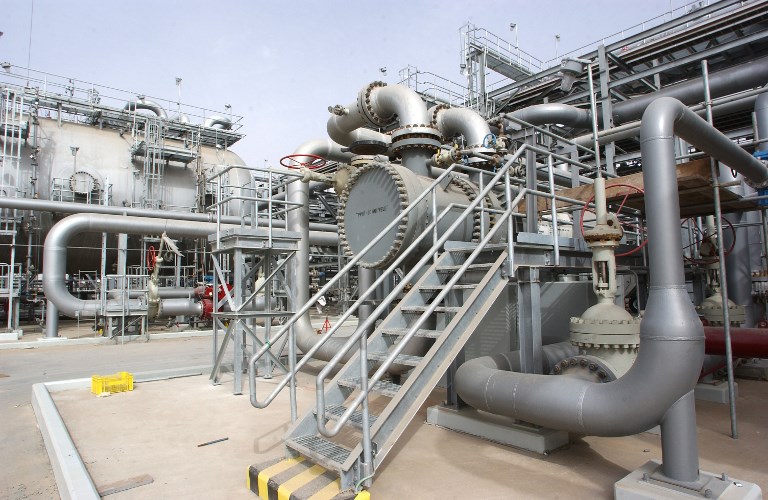
A general view shows an oil production plant in Haradh in the Saudi oil city of Dhahran on March 22, 2006. AFP
VIENNA, Austria — Oil producing nations inside and outside OPEC are expected later Thursday to extend a deal keeping a lid on output in an attempt to push crude prices higher.
But it remained unclear whether they would prolong by six or nine months the accord to reduce production by 1.8 million barrels a day, after its expiry date of March 31, 2018.
The unprecedented agreement among OPEC producers led by Saudi Arabia and others including Russia — but not the United States — was struck a year ago and was extended earlier this year.
The aim was to reduce a vast global excess in supply that had pushed oil prices down to a 13-year low of under $30 a barrel in early 2016 from more than $100 in 2014.
While helping consumers, the low price wreaked havoc with the finances of oil producing nations, prompting belt-tightening even in super-rich Saudi Arabia and other Gulf nations.
It starved OPEC member Venezuela of sorely needed foreign currency, exacerbating a dire economic crisis that has pushed it to the brink of a full-blown debt default.
While of little help to Caracas, where oil output is on course to hit a near 30-year low in 2018, the accord has eventually managed to lift the price of crude.
Oil prices are now almost at a two-year high, with Brent Crude close to $65 per barrel and fellow benchmark West Texas Intermediate recovering to over $60.
They fell back slightly in the days before Thursday’s talks in Vienna.
The huge amounts of unwanted oil sitting in storage worldwide have also fallen to more normal levels, while improved economic conditions, notably in energy-hungry China has also boosted demand.
‘Job is not done’
Saudi Arabia and other members of the Organization of the Petroleum Exporting Countries (OPEC), including Iraq, have made it clear they want the deal to stay in place.
“In the coming months our job will continue. The job is not done,” Khaled al-Falih, Saudi Arabia’s energy minister, said Wednesday in Vienna.
“Let us not take this positive momentum as a reason to sit back and relax. Rather, let us… push onward until we reach our final goal,” echoed Kuwaiti Oil Minister Issam Almarzooq.
But Russia reportedly has misgivings, fearing that an oil price over $60 will help US shale oil producers — who are outside the accord — to ramp up output and grab market share.
In addition, Moscow is pressing for clarity on how and when to end the curbs, Bloomberg News reported, since its economic policy is more complex than that of OPEC members.
Alexander Novak, Russia’s energy minister, said Wednesday in Vienna that a joint committee involving his country and Riyadh had recommended an extension on Wednesday — though he stopped short of saying for how long.
“The market has not yet achieved complete stability and more action is needed beyond April 1. Everyone (in the committee) recommended an extension,” Novak said.
‘New Hitler’
A further possible complication could be the sharp deterioration of relations recently between regional rivals Saudi Arabia and Iran, both of which are OPEC members.
Saudi Arabia’s Crown Prince Mohammed bin Salman last week called Iran’s supreme leader “the new Hitler of the Middle East”.
The two countries, which have long been rivals, are fighting a devastating proxy war in Yemen and also back different sides in the Syrian war.
Iran, following the lifting of sanctions under the 2015 nuclear deal with major powers, was allowed a moderate increase in oil production under the producers’ accord. /cbb